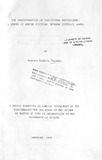| dc.description.abstract | This study is the investigator's attempt to examine
certain principal aspects of agricultural transformation in theWebuye Division of Bungoma District, a division that
is dominated by smallholder subsistence cultivators. The
major objective is to ascertain the extent to which novel agricultural practices have been adopted by farmers and how
the adoption of such innovations is affected by changes in social organization. It was hypothesized that farmers' socio¬economic needs, their social and demographic characteristics, and changes in their extended family relations,are likely major determinants of agricultural transformation (that is, a shift
from the traditional to modern systems of agricultural production). Furthermore, it was posited that farmers' conservative behaviour or non-innovation is a function of limitations imposed by production factors.
As a theoretical framework for understanding this change in agricultural practices, the theory of diffusion was applied
to explain farmers' behaviourin relation to their response
to novel ideas. In other words, it was conceived that this change in agricultural practices is a consequence of external influence from neighbouring communities and change agents, but not merely a result of internal dynamics in the community. By means of a review of the existing literature, random sample survey, and observation, both qualitative and quantitative data ~ere collected and subjected to both descriptive and statistical analyses. The major quantitative analytical techniques included the use of simple frequencies, cross-tabulation, linear correlation, multiple linear regression andR-type factor analysis.
The results of data analysis and hypothesis testing generally show that the transformation of traditional agriculture in Webuye Division is contingent upon farmers' socio-economic needs; that farmers' social and demographic characteristics are not important forces of agricultural transformation; that changes in extended family relations do not markedly effect agricultural production (both traditional and modern), and that non-innovation cannot wholly be accounted for by limited factors of production. It is decuced that agriculturaJ change is a complex ptenomenon which cap not be explained in terms of
one specific dimen8ion of causative variables, but a multiplicity of factors. Both traditional and modern social and economic institutions are seen as complementarily contributing to agricultural production. In this vein, tradition and modernity are conceived as mutually interdependent rather than being
viewed as conflicting or opposed dimensions | en |

